Speaker of Parliament, Alban Sumana Kingsford Bagbin, has expressed deep concerns over the current state of Ghana’s democracy, noting that it has failed to meet the expectations of the majority of Ghanaians despite more than 30 years of political stability.
Speaking at the 2024 University of Ghana (UG) Alumni Lecture on Thursday, September 22, Bagbin argued that while the country has achieved a stable political environment, democracy has not delivered significant improvements in the lives of the people.
Addressing the audience during the 36th edition of the lecture series, Bagbin questioned the efficacy of democracy in Ghana, echoing a growing sentiment among citizens about the shortcomings of the political system. “The question on many of our citizens’ minds is, ‘has democracy really delivered?’ That is a very legitimate question,” he stated. His comments reflect a broader concern that political stability has not necessarily translated into social and economic development for the masses.
The Speaker partly attributed the country’s current challenges to the 1992 Constitution, which, according to him, was primarily designed to secure political stability rather than foster long-term development. Bagbin suggested that the original framers of the Constitution, following the political turbulence of the preceding decades, prioritized stability above all else. “I venture to submit that the focus of the final brains behind the Constitution was to achieve political stability. If my guess is right, I must admit we have succeeded in doing just that, at the expense of development. We now have to move on to focus on development,” he noted.
Bagbin further emphasized that, across the African continent, citizens are growing increasingly disillusioned with democracy. Many view it as a flawed system that benefits only a select few, leaving the majority to struggle with the harsh realities of life. Citing the October 2023 edition of The Economist, he remarked, “Africans are frustrated about the sham that passes for ‘democracy’ in most countries. They are also fed up with flimsy states that provide neither security nor prosperity.” He also referenced findings from the Afrobarometer report, which showed a declining confidence in democratic governance and an increasing attraction to military interventions.
During the lecture, Bagbin also highlighted specific challenges facing Ghana’s democracy, particularly the excessive concentration of power in the hands of the executive and the detrimental effects of the “winner-takes-all” political system. According to Bagbin, while the 1992 Constitution established the separation of powers between the executive, legislature, and judiciary, the executive has grown disproportionately powerful. This imbalance, he argued, has undermined the ability of other branches of government to serve as effective checks on executive authority. He pointed to the recent incident involving Parliament’s passage of an anti-gay bill, which President Nana Addo Dankwa Akufo-Addo has refused to assent to, as an example of the executive overstepping its bounds.
Additionally, Bagbin criticized the winner-takes-all nature of Ghana’s political system, which he believes has led to deep political divisions and heightened tensions between ruling and opposition parties. “Our Constitution has no room for power sharing. This has led to what many describe as the ‘syndrome of winner takes all’. Once a party wins power, all other parties are practically excluded from participating in the governance of the country,” he lamented.

